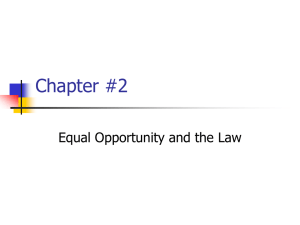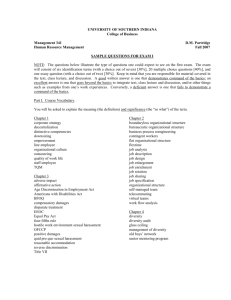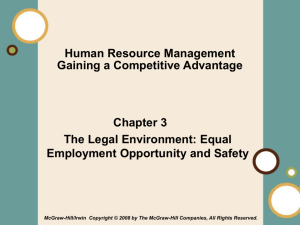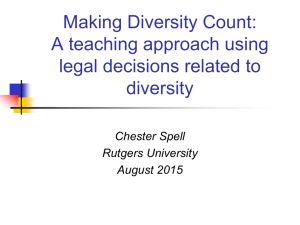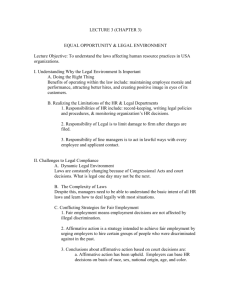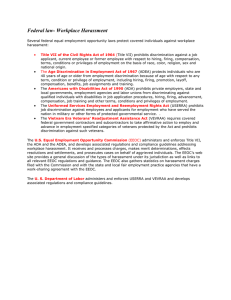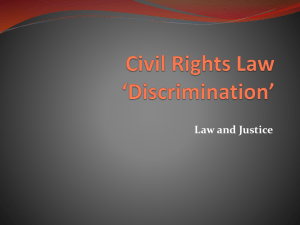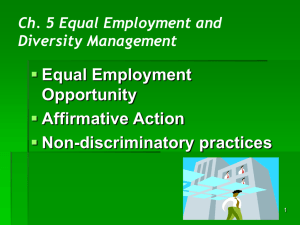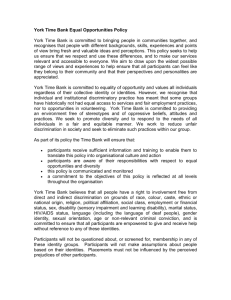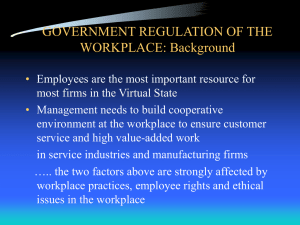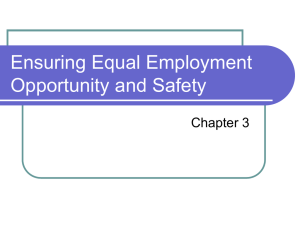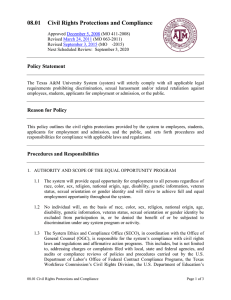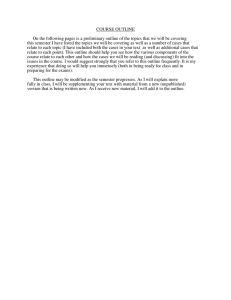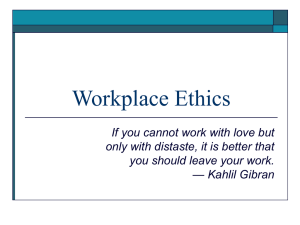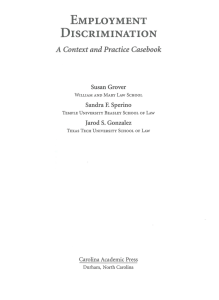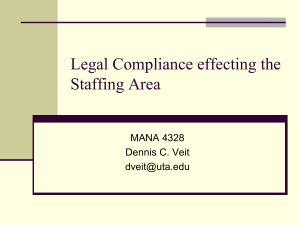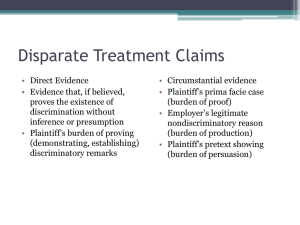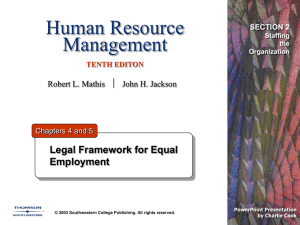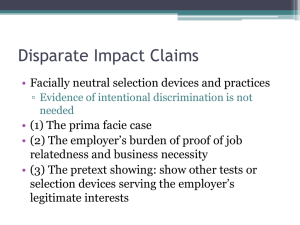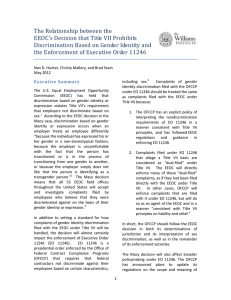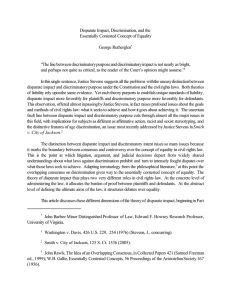Legal Regulation of Human Resource Management
advertisement
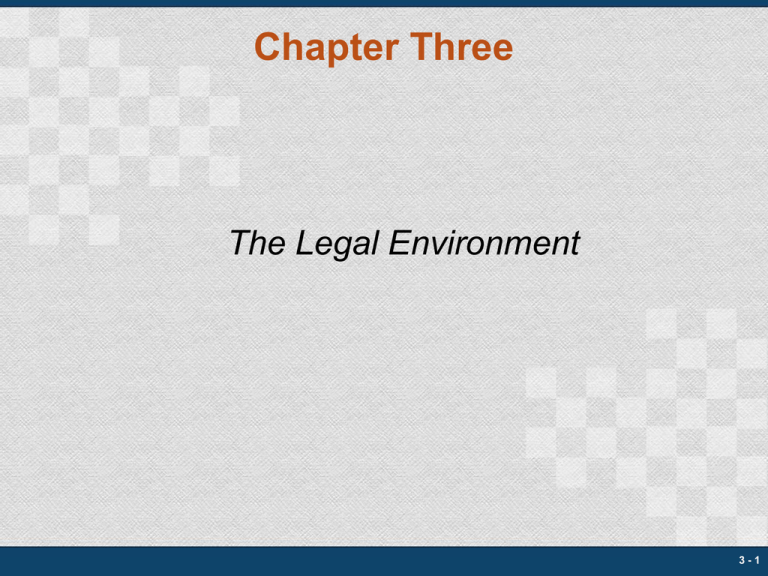
Chapter Three The Legal Environment 3-1 Chapter Outline • The Legal Context of Human Resource Management • Equal Employment Opportunity • Legal Issues in Compensation • Legal Issues in Labor Relations • Legislation and Employee Rights • Evaluating Legal Compliance 3-2 The Regulatory Environment of Human Resource Management • Regulation can come in the form of new laws or statutes passed by national, state, or local government bodies. • Most regulations start at the national level. • State and local regulations are more likely to extend or modify national regulations than create new ones. 3-3 Steps in the Regulation Process Creation of new regulations Enforcemen t of regulations Practice and implementation of regulations in organizations 3-4 Legal Regulation of Human Resource Management 3-5 Title VII of the Civil Rights Act (人權法案第七條) • Title VII of the Civil Rights Act of 1964 – It is illegal for an employer to fail or refuse to hire or to discharge any individual or to discriminate in any other way against any individual with respect to any aspect of the employment relationship on the basis of that individual’s race, color, religious beliefs, sex, or national origin 3-6 Definitions of Discrimination • Illegal discrimination – What results from behaviors or actions by an organization or managers within an organization that cause members of a protected class to be unfairly differentiated from others • Disparate treatment – When individuals in similar situations are treated differently and when the differential treatment is based on the individual’s race, color, religion, sex, national origin, age, or disability status 3-7 Title VII of the Civil Rights Act (人權法案第七條) • Subsequent court decisions relating to Title VII have defined the meanings of disparate impact, job relatedness, bona fide occupational qualification, sexual harassment, and other factors. 3-8 歧視的認定 • Disparate impact – Occurs when an apparently neutral employment practice disproportionately excludes a protected group from employment opportunities • Four-fifths rule(百分八十的規則 ) – Disparate impact exists if a selection criterion (such as a test score) results in a selection rate for a protected class that is less than four-fifths (80 percent) of that for the majority group 3-9 歧視的認定 • Geographical comparisons – A method to determine disparate impact. In this case, the presence of protected class employees in a company’s workforce is compared with the presence of qualified members of that protected class in the geographical area from which the company draws applicants. 3 - 10 Affirmative Action and Reverse Discrimination • Affirmative action(平權行動/積極優惠行 動) – A set of steps taken by an organization to seek qualified applicants from groups underrepresented in the workforce – 1.Utilization analysis • A comparison of the race, sex, and ethnic composition of the employer’s workforce compared to that of the available labor supply – 2.設定目標 – 3.執行 3 - 11 What Is Reverse Discrimination? • Any practice that has disparate impact on members of nonprotected classes • Quota systems where an organization would be required to hire a certain number of black females would be considered reverse discrimination relative to white males, unless the system was dictated by a court order. 3 - 12 Sexual Harassment at Work • Quid pro quo harassment(交換性的性騷 擾) – Sexual harassment in which the harasser offers to exchange something of value for sexual favors • Hostile work environment – A more subtle form of sexual harassment that results from a climate or culture that is punitive toward people of a different gender 3 - 13 Enforcing Equal Employment Opportunity • EEOC (Equal Employment Opportunity Commission) • Major functions of the EEOC – Investigating and resolving complaints about alleged discrimination – Gathering information regarding employment patterns and trends in U.S. businesses – Issuing information about new employment guidelines as they become relevant 3 - 14 Investigating and Resolving a Discrimination Complaint 3 - 15 Investigating and Resolving a Discrimination Complaint (cont’d) 3 - 16 Enforcing Equal Employment Opportunity • OFCCP (Office of Federal Contract Compliance Procedures) • Major functions of the OFCCP – OFCCP conducts yearly audits of government contractors to ensure that they have actively pursuing their affirmative action goals. 3 - 17 Ethics and Human Resource Management • Ethics – An individual’s beliefs about what is right and wrong and what is good and bad • Ethics and law don’t always coincide • Managers must take steps to ensure their behavior is both ethical and legal. 3 - 18 Evaluating Legal Compliance • 1.Ensure that managers have a clear understanding of the laws that govern every aspect of HRM. • 2.Managers should rely on their own legal human resource staff to answer questions and review procedures. • 3.Engage in external legal audits of human resource management procedures. 3 - 19
